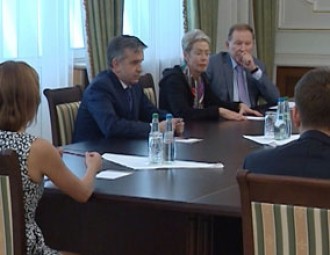The negotiations of the contact group on Ukraine are to continue on September 5

Yesterday’s session of the OSCE contact group on Ukraine brought no results: the parties stayed with their views.
Representatives of Ukraine, Russia, the OSCE, Donetsk People's Republic (DPR) and Lugansk People's Republic (LPR) met in Minsk on September 1.
DPR was represented by Andrei Purgin who called himself "Deputy Prime Minister" of "Donetsk People's Republic." It should be recalled that Purgin participated in the previous meeting of the contact group in Minsk which took place on 31 July. The so-called Lugansk People's Republic was represented in the Belarusan capital by Alexey Karyakin, "Speaker of the Supreme Council."
As Euroradio quotes RIA Novosti, representatives of the self-proclaimed republics demanded that Kiev declared amnesty for "political prisoners and members of the people's militia, as well as politicians, deputies, government workers and other staff of other structures of people's republics." They also demanded to guarantee their "republics" special conditions of foreign trade activities "considering the need to integrate with Russia and the Customs Union."
In exchange for the fulfillment of their demands, the representatives of the PRD and PRL have promised to make "every effort to prevent splitting of Ukraine."
As “EuroBelarus” Information Service earlier reported, on August 26 tripartite negotiations on settling the military conflict in Ukraine took place in Minsk, which didn’t bring any visible results. Before that, on July 31, Minsk hosted negotiations on settling the Donbas situation on July 31 in Minsk, with participation of Ukraine's former President Leonid Kuchma, Russia's Ambassador Mikhail Zurabov and an OSCE representative.
-
03.01
-
07.10
-
22.09
-
17.08
-
12.08
-
30.09








































